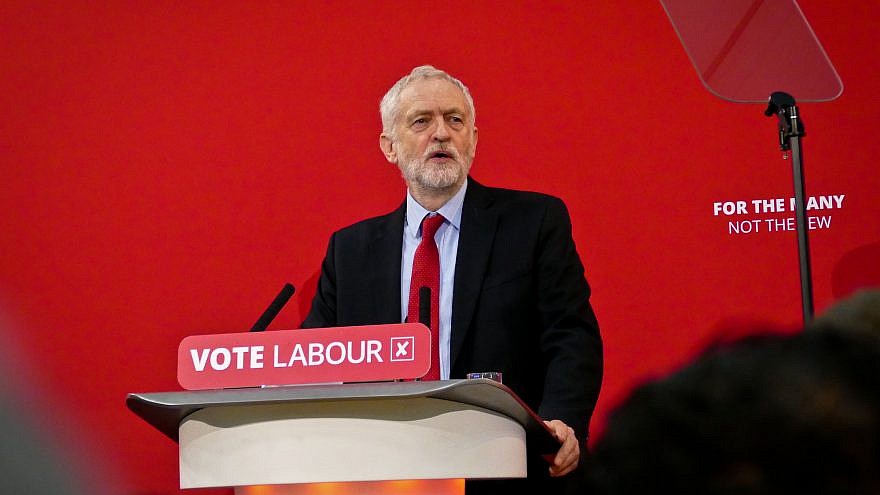History will not be kind to Jeremy Corbyn, the vanquished and soon-to-be former leader of the opposition British Labour Party.
Having been trounced by British Prime Minister Boris Johnson’s Conservative Party in last week’s general election—his second electoral defeat in the space of two years—Corbyn will now enter the gallery of Labour leaders who never made it out of the opposition. Having won the leader’s post almost by accident in 2015, Corbyn’s four years at the top were marked by the growing control of the far-left over the party machine and the corresponding alienation—not to say irritation—of those British voters who deserted Labour in its most precious heartlands. The historic scale of Corbyn’s failure on Dec. 12 is amplified by the fact that, on paper, this election was much more winnable for the Labour Party when compared with its face-offs against the formidable Margaret Thatcher in the 1980s; and yet, the Brexit mess, the bitter divisions among the Tories and the undistinguished legacies of Johnson’s immediate predecessors, David Cameron and Theresa May, all faded in the minds of voters who were much more worried about life under a Corbyn government.
Foremost in the litany of Corbyn’s failures—failure to win an election, failure to articulate a clear position on Brexit, failure to own his failure when making his concession speech—is the tarnishing of Labour’s democratic, anti-racist credentials by the anti-Semitism in the ranks of his supporters, many of whom only joined the party after he became leader. There is no need here to repeat the sorry tale of how Corbyn horrified the overwhelming majority of Britain’s 300,000 Jews, other than to note that he turned the term “anti-Semitism” into a household word, so often did it appear in the headlines. But as bruising and hurtful as the Corbyn years have been for British Jews, there is something of an irony—a concept that Corbyn once said British-born “Zionists” couldn’t properly grasp—in the fact that the most damaged one of all, at the end of this ordeal, is Corbyn himself. It’s hard to say to what extent the anti-Semitism outrages influenced British voters against Labour, but one thing is certain: They didn’t exactly advance the cause.
The most important question going forward is whether the Labour Party can now cleanse itself from anti-Semitism accusations. Will the anti-Semitic tendencies demonstrated by hundreds of party activists die with Corbyn’s failed leadership, or will they persist under his successor?
There are reasons to feel hopeful that Labour may, in the near future, seek to rebuild the shattered trust of British Jews. Certainly, were leadership contenders like Keir Starmer or Jess Phillips—both of whom have been mortified by Corbyn’s attitude to the Jewish community—to triumph in a leadership contest, the fence-mending could begin immediately. And even those leadership contenders who have been solidly loyal to Corbyn will, for the good of the party, want to repair its reputation so that the party is credibly seen as a force against anti-Semitism, and not as its enabler.
The problem, however, is that Corbyn is deliberately standing in the way of such potential changes. His lack of humility is such that he didn’t feel the need to resign immediately as Labour leader following his abysmal showing in the election. Instead, Corbyn will stick around until early 2020, presiding over a period of “reflection” on the party’s trajectory while he has been at its helm. Expect, therefore, to hear much of what we’ve already been hearing: that Labour’s manifesto contained policies that voters loved; that Brexit distorted the playing field to the extent that other issues were buried; that Corbyn’s image among the public was only so dire because he was smeared beyond recognition by a hostile media. Do not expect to hear any contrition or regret for the anti-Semitic propaganda that has flourished under Corbyn’s leadership.
Those Labour activists who truly want to reflect have some very painful questions to ask of themselves. Not all these questions concern the treatment of British Jews, but I want to mention one that is particularly pertinent. If it is true to contend that Boris Johnson promises only more austerity and more strife with the European Union, then what are the issues that that Labour Party should focus on? More importantly, perhaps, what are the issues that Labour should be seen to be focusing on? The 2019 general election tells us resoundingly, and without doubt, that the Palestinian cause—so precious to the Corbyn leadership that Palestinian flags were the most common sight at Labour’s last annual conference—is not one of them.
No one would expect support for the Palestinians to simply disappear from Labour’s ranks. But until the party acknowledges that the manner of its solidarity was the root cause of its conflict with the Jewish community—that it led to the fundamental loyalties of British Jews being questioned and the Jewish state defamed as a racist, rogue state— there will be no progress.


























